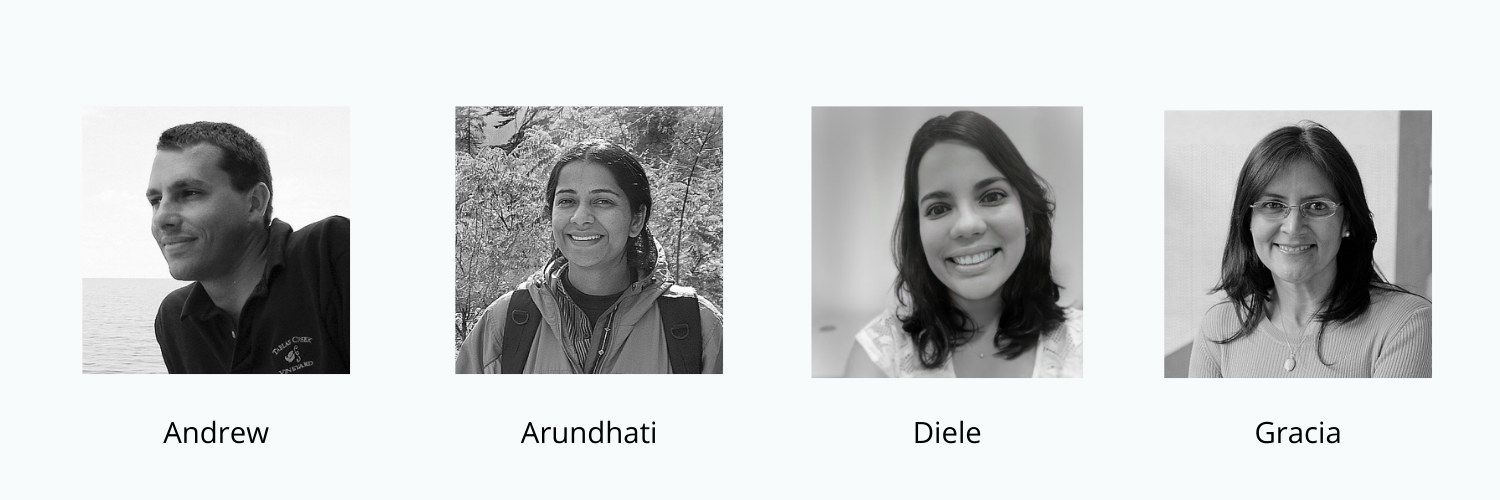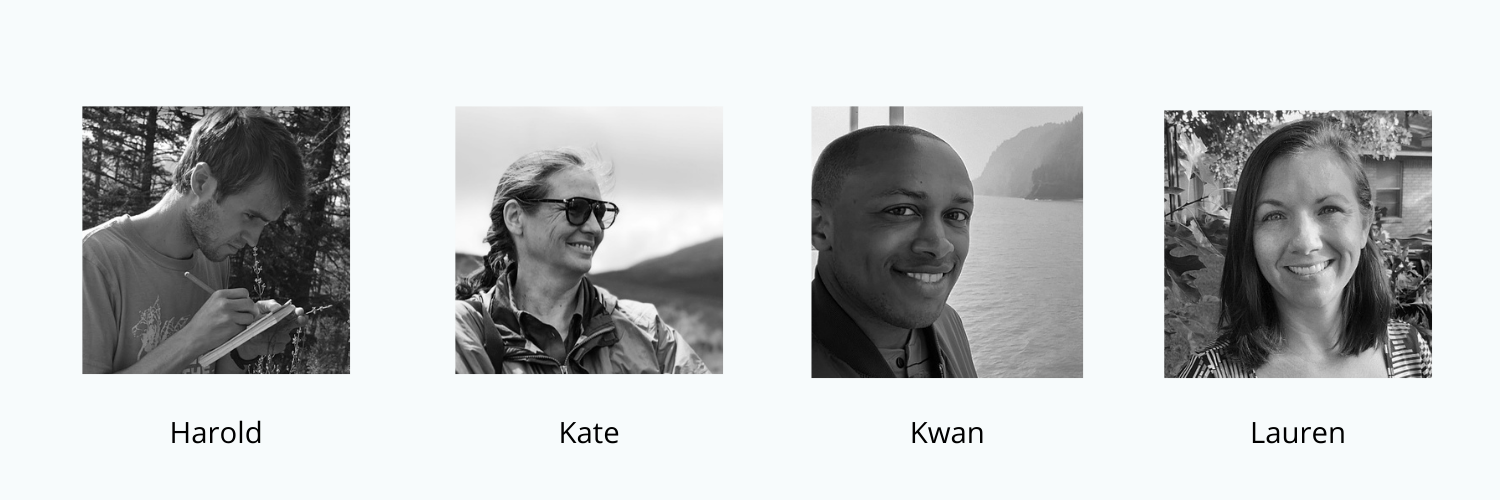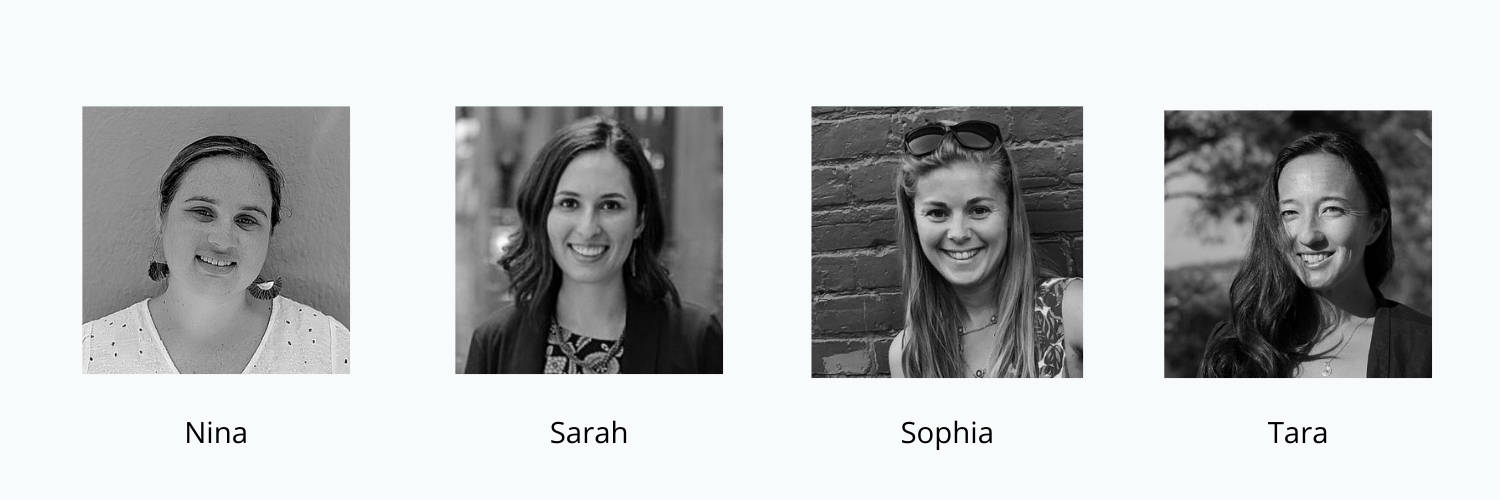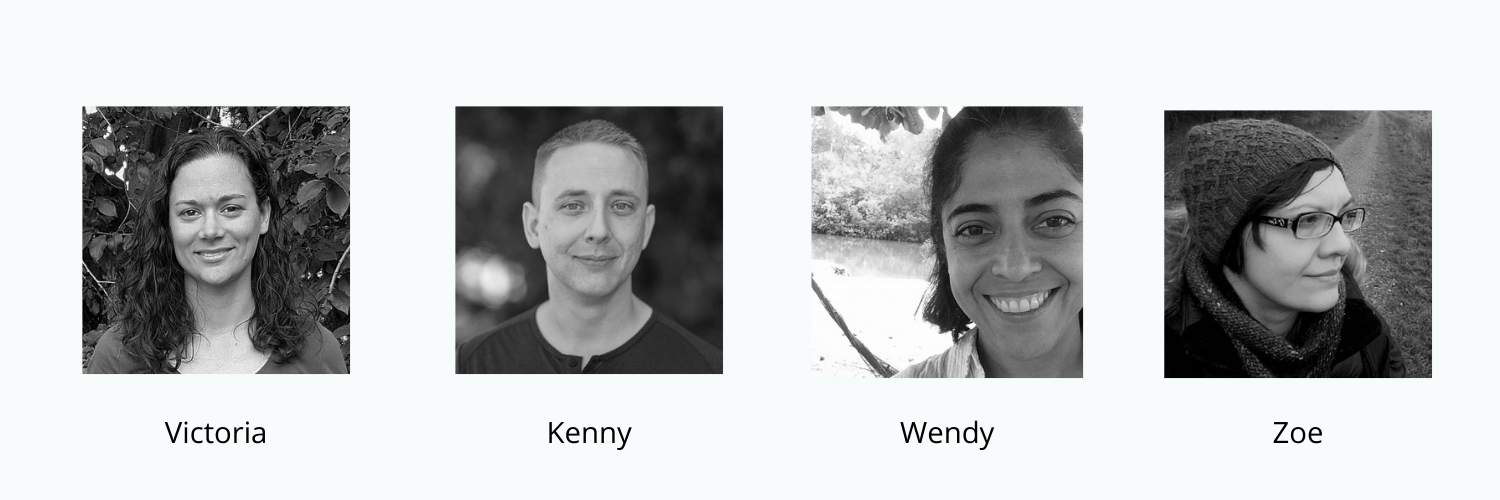About Us
The Disciplinary Inclusion Task Force has successfully concluded its work. If you have any questions or would like additional information about the task force’s initiatives, please contact Sophia Winkler-Schor.
BIOS




Sophia Winkler-Schor (Co-Chair)
Conservation psychologist
Sophia is a Ph.D. student at the Nelson Institute for Environmental Studies at the University of Wisconsin-Madison. Sophia’s research brings together psychology, marketing and conservation science to understand what motivates people to engage in conservation programs and more importantly how conservation campaigns can foster long-term engagement. Specifically, Sophia’s doctoral research investigates how to cultivate intrinsic motivation among participants in conservation payment programs on the Yucatan Peninsula in Mexico. Sophia is an active member of SCB serving on the SSWG board, where she chairs the Communications Committee. In 2018 at NACCB, Sophia began organizing to promote attention to disciplinary inclusion at SCB, and these efforts resulted in the creation of the Disciplinary Inclusion Task Force. For more information about Sophia’s research and interests, visit her website at Sophiawinklerschor.com or Twitter @ScientistSophia.
Kenny Wallen, Ph.D. (Co-Chair)
Prac-academic
Kenny is a pracademic, with a joint Assistant Professor of human dimensions of fish and wildlife appointment at the University of Idaho, Dept. of Natural Resources and Society, and the Idaho Dept. of Fish and Game (www.human-element-lab.com). His research frames human behavior as the cause of social-environmental problems but also the means to solve them, and so views conservation and natural resources management through the lens of psychology, sociology, and behavioral science. He uses survey methods, experiments, and statistical models to understand the nature of and reasons for behavior, with a primary interest in norms, rules, and institutions.
Dr. Kate Christen
Environmental Historian
Kate is an environmental historian. She studies the history of conservation and of conservation science/allied disciplines and practices, and she’s also spent much of her career to date working in conservation science venues, including the Smithsonian Conservation Biology Institute (SCBI).
At SCB, Kate served as a member of the Board of Governors (BoG) from 2008 – 2017. She also co-founded SCB’s Social Science Working Group (SSWG) in 2004-2005, serving as a SSWG Board Member that year. Kate received my AB in history from Harvard/Radcliffe Colleges, and my MA and Ph.D. in history from the Johns Hopkins University, with pre-doctoral fellowships from Fulbright and American Association of University Women. Kate is fluent in Spanish and speaks reasonably good French and German; I can pretty much read Portuguese. She prefers to spend as much time as possible in the outdoors, especially on cross-country skis.
Dr. Gracia Lanza
Agricultural and environmental economist
Gracia is the head of the Economy, Environment, and Sustainable Agribusiness Research Unit (UEASS) at the Tropical Agricultural Research and Higher Education Center (CATIE). She is the program manager and researcher of the Sustainable Management of Oceans and Marine Resources" collaborative program. Her research areas include the effect of market instruments, norms, and social networks on environmental behavior and the impact of cognitive and socio-economic characteristics on the adoption of environmentally friendly technologies. She leads the area of agriculture and behavioral economics. She received her Ph.D. from the University of Gottingen, Germany and her master's degree in Environmental Economics and Policy, from Wageningen University and Research Center. She has more than 15 years of experience as a practitioner in the implementation of development projects.
Dr. Kwan-Lamar Blount-Hill
Green criminologist
Kwan is the Director of Research and Data Analytics for the Kings County District Attorney’s Office in Brooklyn, New York and an adjunct assistant professor at the Borough of Manhattan Community College. A criminologist and lawyer, Kwan has applied theories of social identity and dominance to explore marginalization and human disregard for wildlife and animal welfare. Moreover, he has advocated for interdisciplinarity in theory and policy development. Kwan previously served at the New York City’s Mayor’s Office of Criminal Justice, and as a police officer and firefighter in South Carolina. He earned a B.S. in environmental science from Tuskegee University, JD from Emory University, and PhD in criminal justice from the City University of New York’s Graduate Center/John Jay College.
Zoe Nyssa
Ethnographer
A member of SCB since 2008, Dr. Nyssa is a cultural anthropologist specializing in knowledge practices within conservation and climate sciences as well as environmental decision-making broadly. Her research combines traditional ethnographic and qualitative methods with techniques from computational social science, particularly text mining and topic modeling, in order to study the relationships between knowledge practices, governance, and justice. Her work has been funded by a number of organizations; previously she was a Predoctoral Fellow at the Max Planck Institute for History of Science in Berlin and Ziff Postdoctoral Research Fellow at the Harvard University Center for the Environment and the Program on Science, Technology and Society at the Harvard Kennedy School of Government. Nyssa has advised a number of leading scientific and environmental organizations and is currently an Assistant Professor of Anthropology at Purdue University, West Lafayette.
SECRETARY
Sarah Stephen
Conservation scientist
Sarah holds a dual-degree master in International Nature Conservation based out of Germany and New Zealand. Her background is wholly interdisciplinary with her bachelor studies in Environmental Science also having focused on bridging the social and natural sciences. Her interests narrow in on global change issues, biodiversity conservation and social justice using tools such as spatial analysis and computer modeling. Sarah has been passionately active for the last few years within SCB's SSWG through the Student Affairs and Communications Committees and now the Disciplinary Inclusion Task Force.
TASK FORCE MEMBERS
Andrew Wright
Marine biologist
Andrew is a British marine biologist who has been working on the science-policy boundary around the world for nearly two decades. His experiences have led him to champion a better communication of science to policy makers and the lay public. His research has included analyses of sperm whales and harbour porpoise bioacoustics, the impacts of noise on various marine mammals and an exploration of how stress responses are reflected in cetacean skin. Andrew is currently studying North Atlantic right whales with Fisheries and Oceans Canada in Nova Scotia. He is also spearheading efforts to bring more marketing techniques into conservation outreach, having co-founded the Conservation Marketing and Engagement Working Group of the SCB. He has also worked to introduce conservation to sci-fi fans through the Facebook page Vaquita Are Browncoats.
Arundhati Jagadish
Conservation social scientist
Arundhati is a conservation social scientist interested in understanding how human decision-making drives the spread of conservation initiatives. Broadly, her research applies diffusion of innovations theory to understand how conservation programs and behaviors diffuse across socio-ecological systems. Specifically, her research at the NGO Conservation International investigates factors affecting the adoption and spread of Locally Managed Marine Areas in the South Pacific and Western Indian Ocean. This work contributes to the NGO-led collaboration Alliance for Conservation Evidence and Sustainability (ACES), which focusses on generating, synthesizing, and using evidence for community-based conservation. Arundhati holds a Ph.D. in Forestry and Natural Resources from the University of Georgia, USA, and a Master’s in Environmental Studies from The Environmental Research Institute, India. She has previously done research in the Himalayas and coastal India.
Diele Lobo
Conservation scientist
Diele is a Ph.D. candidate in Conservation Sciences at the University of Minnesota. Her current research explores issues and topics on conservation entrepreneurship, ecosystem services co-production, climate resilience, and gender equity. Her work spans the natural and social sciences with a particular focus on delivering science to inform decision making to conservation problems in developing economy contexts. Diele previously earned a master's degree in Forest Ecology at the Federal University of Pernambuco, where her research resulted in a how-to guidebook on ecological restoration that served as a landmark work for restoration practice and policy in Northeast Brazil.
Harold Eyster
Conservation scientist
Harold is a Ph.D. candidate at the University of British Columbia, where he peers at environmental challenges through a relational lens. Using a transdisciplinary approach that recognizes the importance of diverse disciplines and methods from ecology, sociology, anthropology, psychology, economics, etc., he tests how today’s salient human-nature relationships can be marshaled to enact a more sustainable world. Before coming to UBC, Harold received his A.B. from Harvard University, where he co-founded the Harvard College Review of Environment and Society. He brings a joy for birding, painting, Bayesian inference, and ultramarathons to his research, though he has yet to figure out a way of incorporating his atlatl skills.
Lauren Redmore
Conservation social scientist and Anthropologist
Lauren works at the intersection of rural development and conservation. She holds an M.Sc. from Oregon State University in Forest Resources, where she researched the Woman Owning Woodlands Network, a forestry extension program by and for women who own and manage woodlands. She was a Peace Corps volunteer in Cameroon, where she also managed a freshwater fisheries community-based conservation project while working for the Zoological Society of London. For her Ph.D. at Texas A&M, Lauren studied human-elephant interactions in rural Botswana, bringing an ethnographic approach to understand what life is like for people who share space with elephants. Lauren also holds a certificate from the Applied Biodiversity Sciences Program from Texas A&M. She is an SCB member where she serves on several different committees. She currently works at the National Recreation and Park Association as an Evaluation Manager.
Nina Hamilton
Nina's work lies at the intersection of professional networks, capacity development, and environmental education, and she is passionate about cultivating productive and inclusive professional communities. Nina is currently the International Programs Specialist at the North American Association for Environmental Education where she supports a global learning network and manages a youth leadership program, and also has experience in community-based conservation practice and participatory research in Madagascar and Gabon. She has a BA in Biology from Kenyon College and a Master of Environmental Management from Duke University’s Nicholas School of the Environment.
Tara Sayuri Whitty
Socio-ecologist
Tara works as a consultant through her corporation, Keiruna Inc., in the realm of social-ecological conservation research, evaluation, training, and various aspects of implementation, with a focus on coastal systems. Informed by extensive on-the-ground experience, primarily in Southeast Asia, Tara’s work seeks innovative, socially responsible approaches to ethical and effective conservation, including more equitable representation in the field. Following her Ph.D. and NSF SEES Postdoctoral Fellowship at the Center for Marine Biodiversity and Conservation at Scripps Institution of Oceanography, UCSD, Tara worked for IUCN in Myanmar to implement their work on a large, multi-sector natural resource management and conservation project in the Gulf of Mottama. As a consultant, she continues working as a conservation research advisor to Myanmar Coastal Conservation Lab, as well as working for Helvetas Myanmar on the Gulf of Mottama Project and the Large Marine Vertebrates Research Institute in the Philippines on coastal conservation systems.
Victoria Lukasik
Wildlife practitioner
Dr. Victoria Lukasik is a wildlife professional with training in both the natural (BSc: Wildlife Biology, MSc: Spatial Ecology) and social sciences (Ph.D.: Geography). She has experience in academic research, conservation research and practice, environmental education, advocacy, and industry. Her research interests focus on the social and ecological nexus of wildlife management and conservation, including human-carnivore coexistence and the roles of science and ethics in wildlife management. She is currently continuing work from her Ph.D., which examined carnivore management in western Canada, using primarily qualitative methods to understand the experiences and perceptions of wildlife managers.
Wendy Chávez-Páez
Researcher and practitioner in community-based mangrove management and Public policy analyst
Wendy studied Economics at the Polytechnic School (ESPOL) in Ecuador and holds a master’s degree in Public Administration from John Jay College of Criminal Justice in New York. She has professional experience in the Ecuadorian public sector, from the central and local governments. Later in her life, she studied a master’s in Human Settlements at KU Leuven in Belgium, did fieldwork in Ecuador and wrote a dissertation about the socio-ecological conflicts and the challenges of climate change faced by the coastal communities of a RAMSAR site located in the Gulf of Guayaquil (her city). At the moment, she is a researcher and practitioner in community-based mangrove management and works in a local NGO. Her work involves providing technical assistance to mangrove communities in their relations with universities and government institutions. Wendy aims to earn her PhD to explore current challenges in community-based natural resources management.